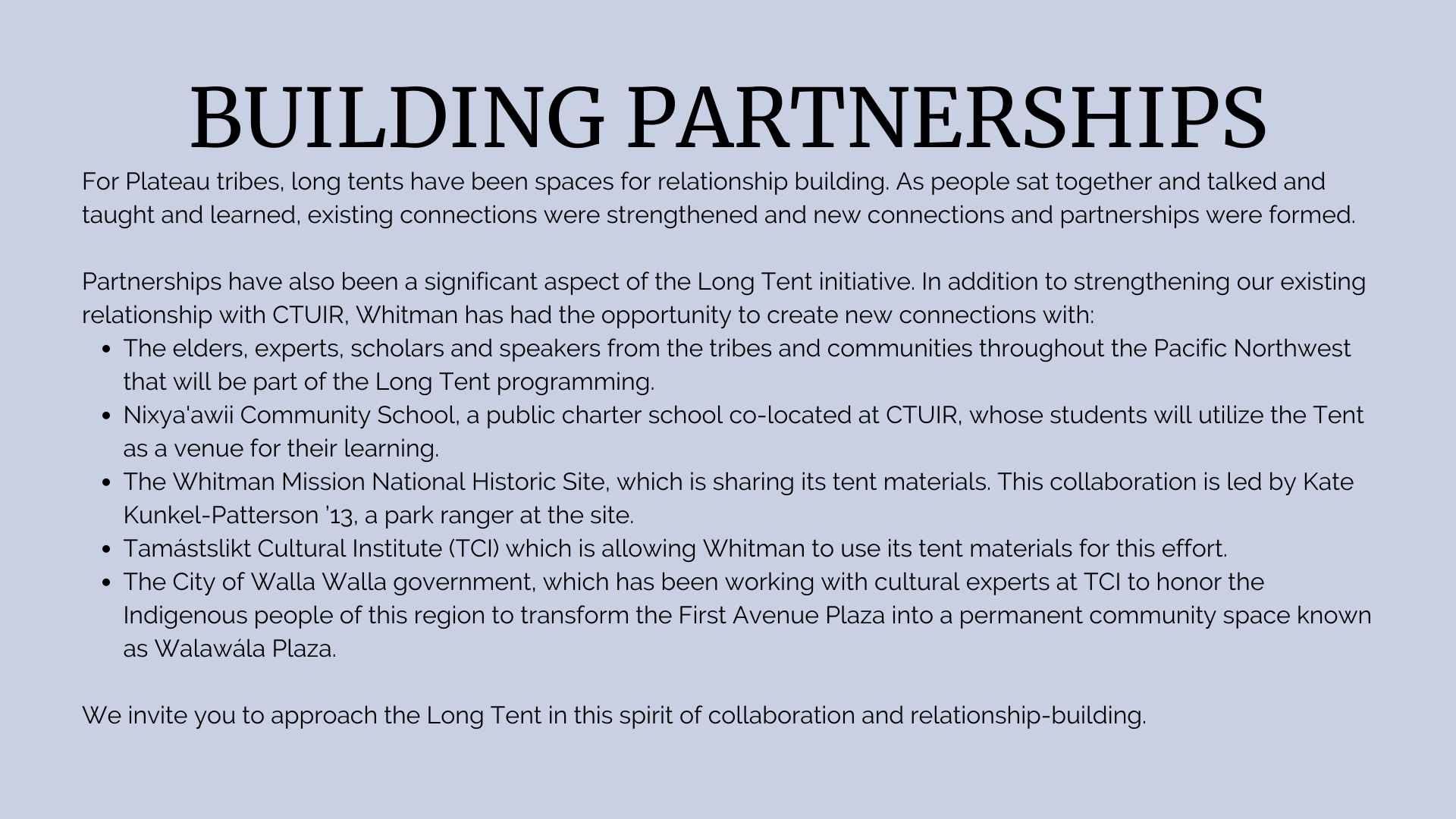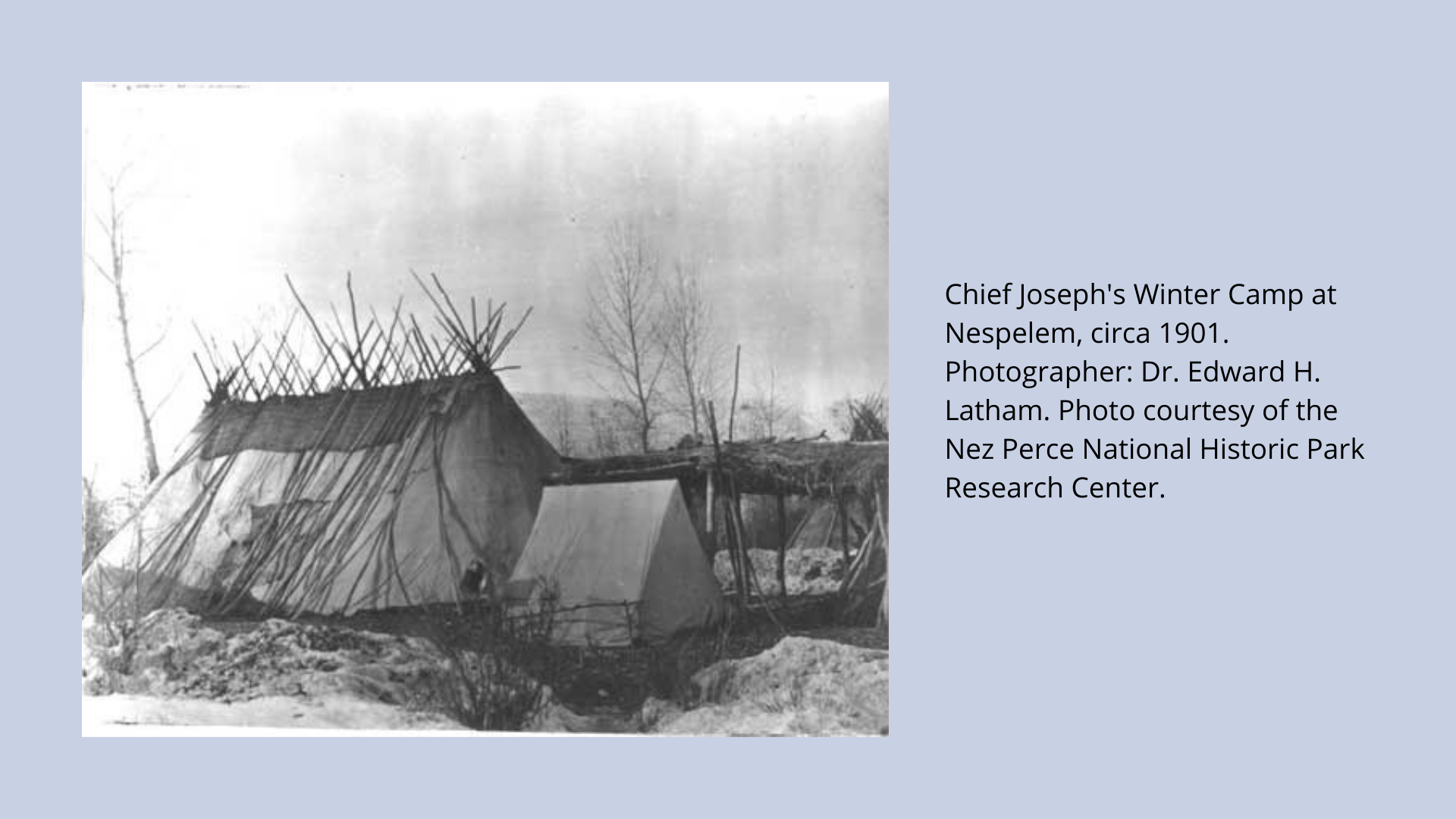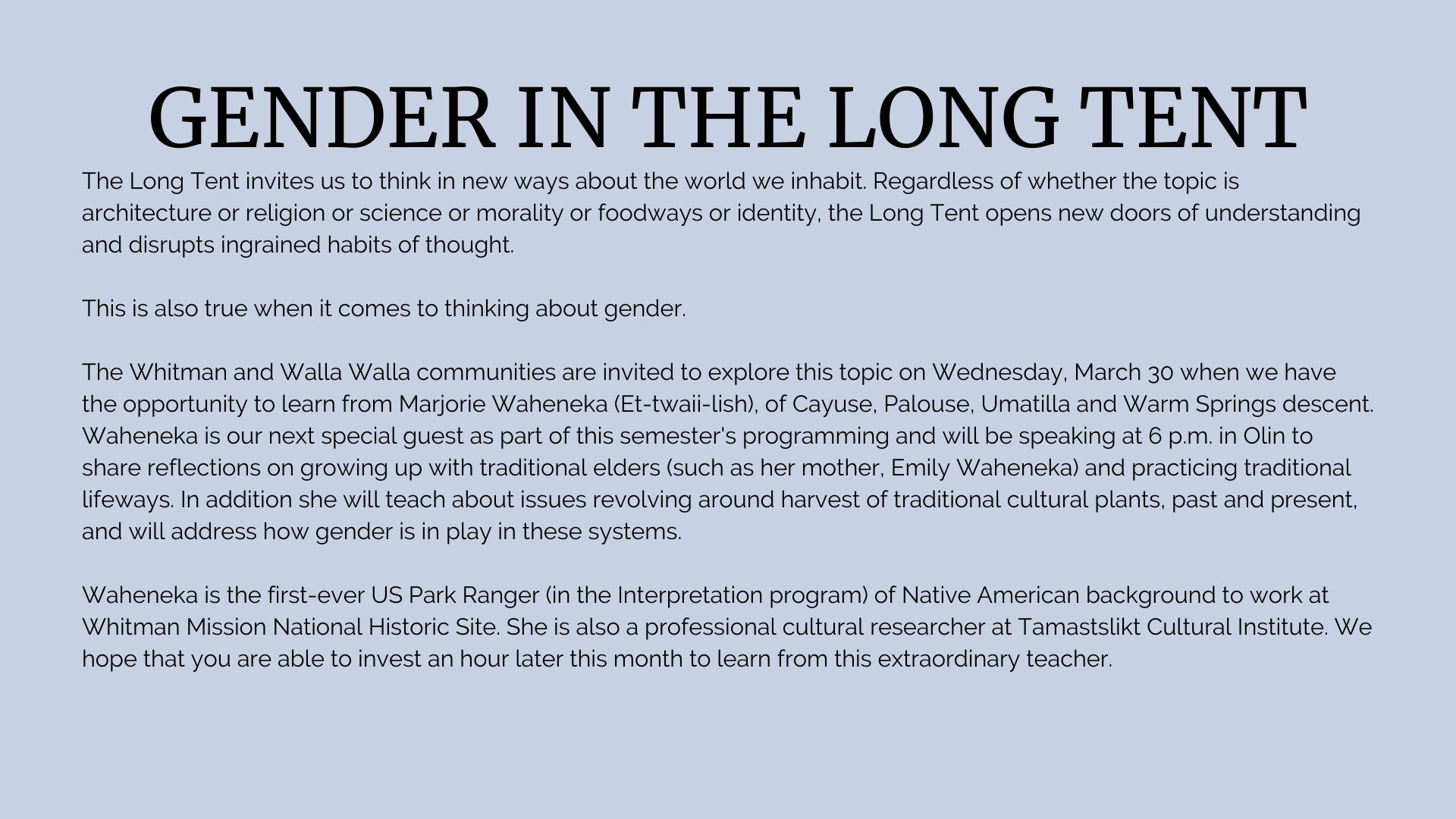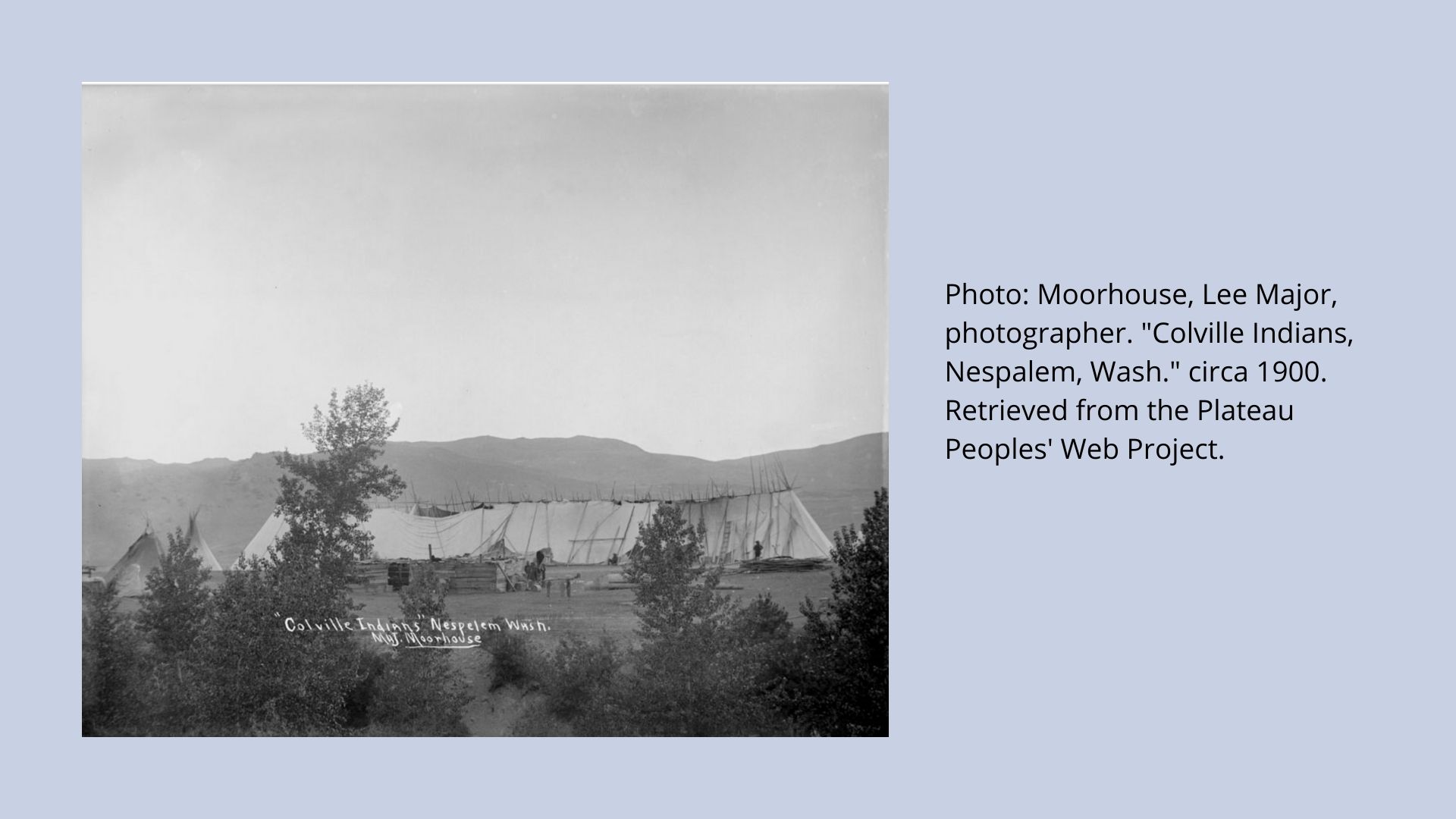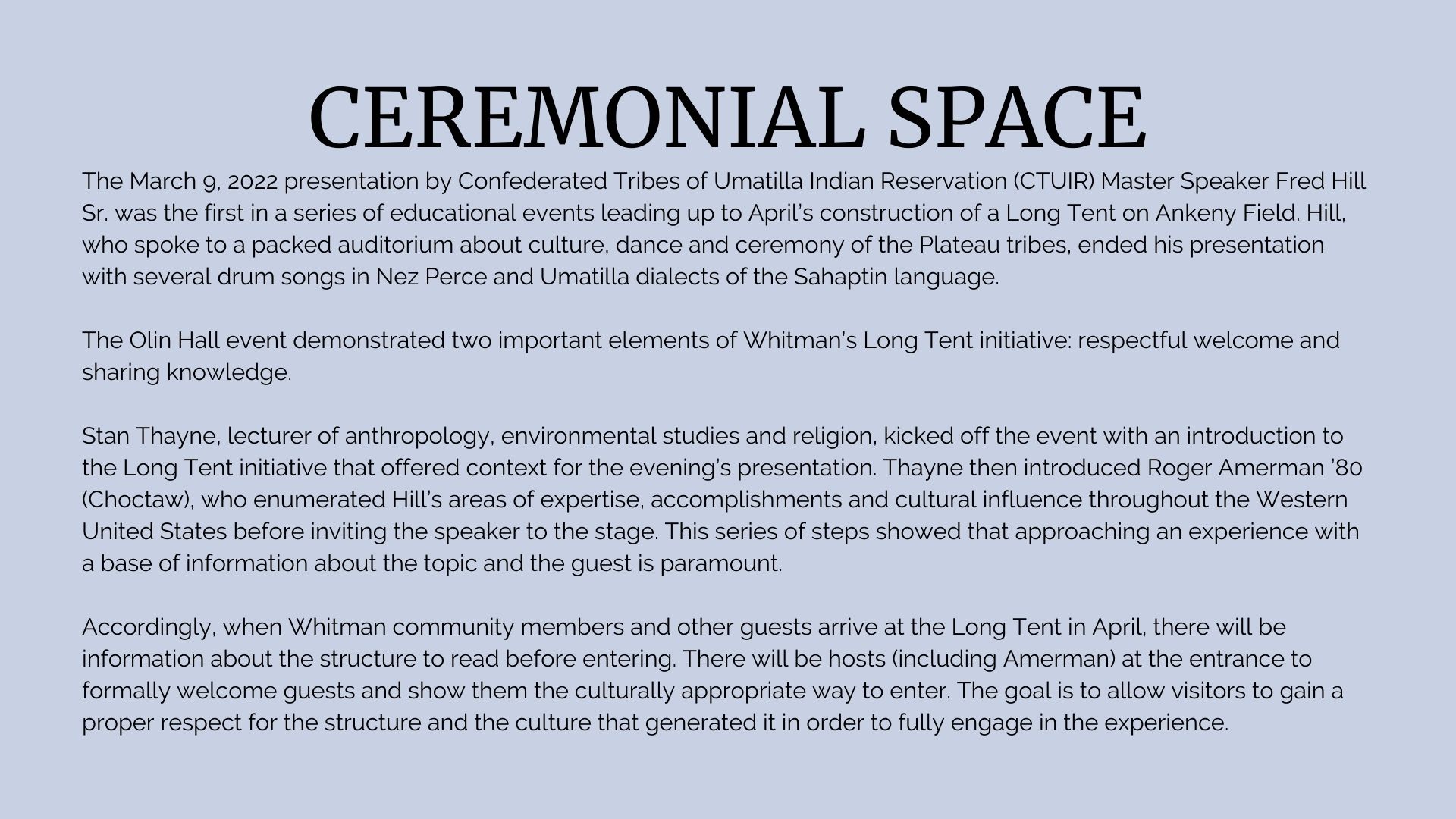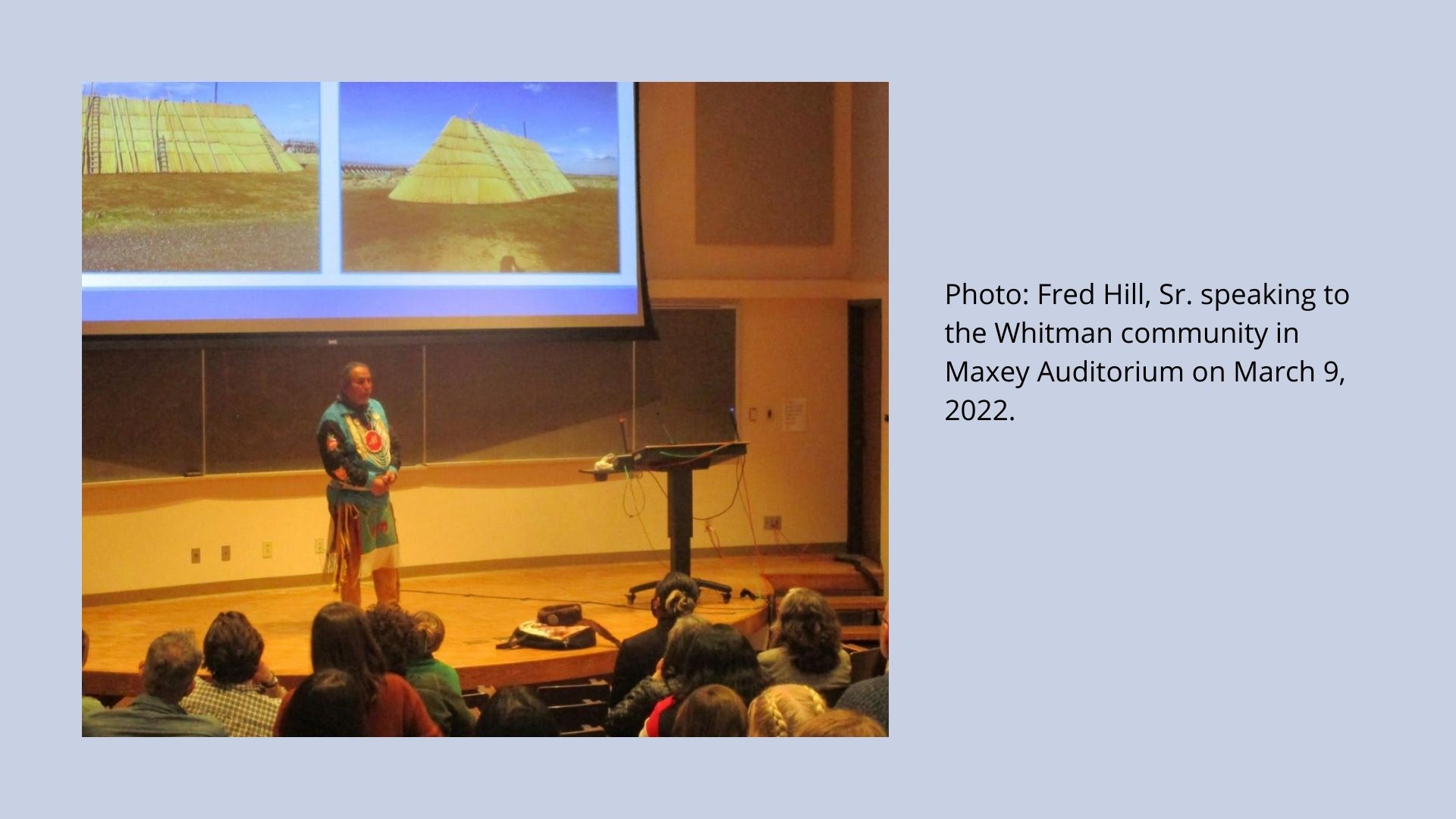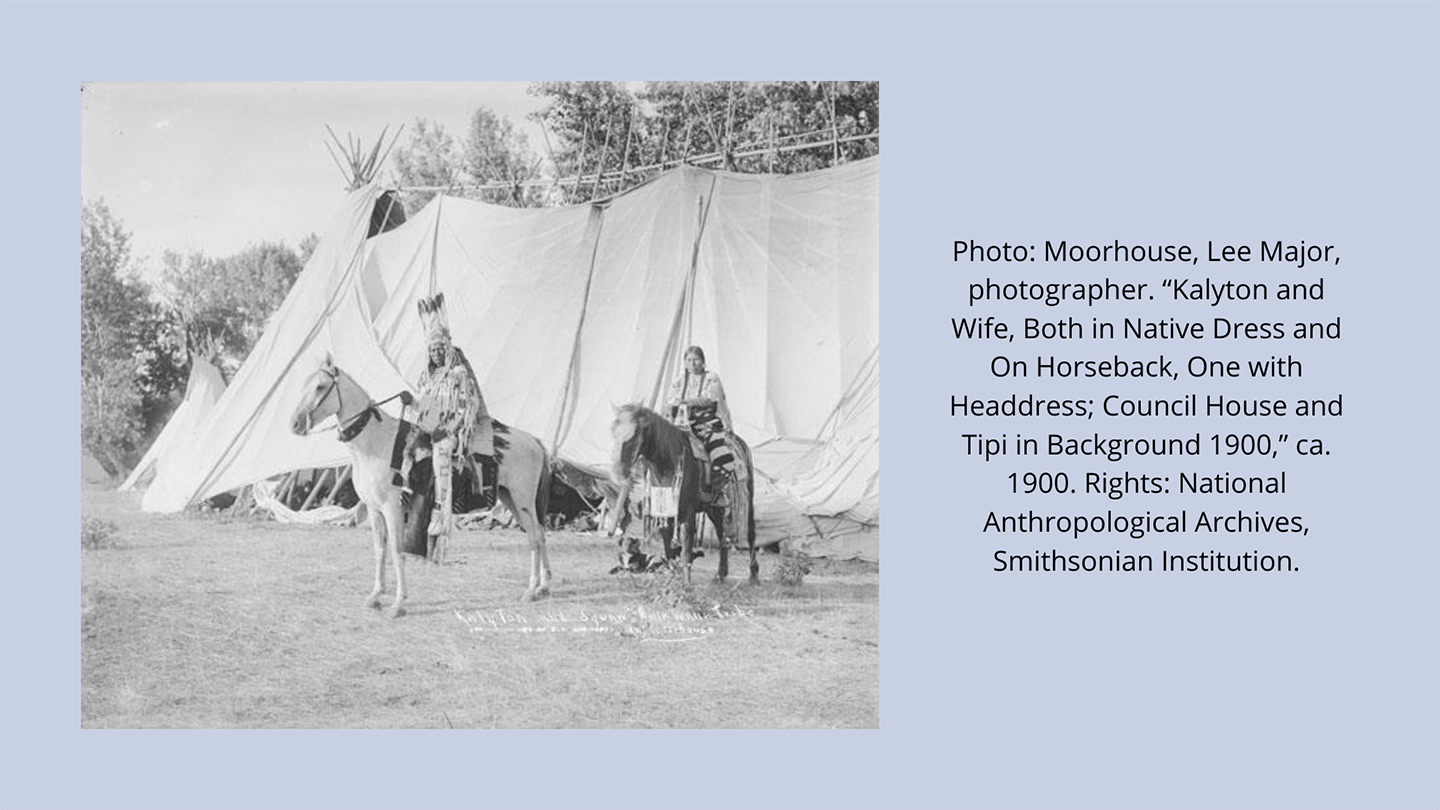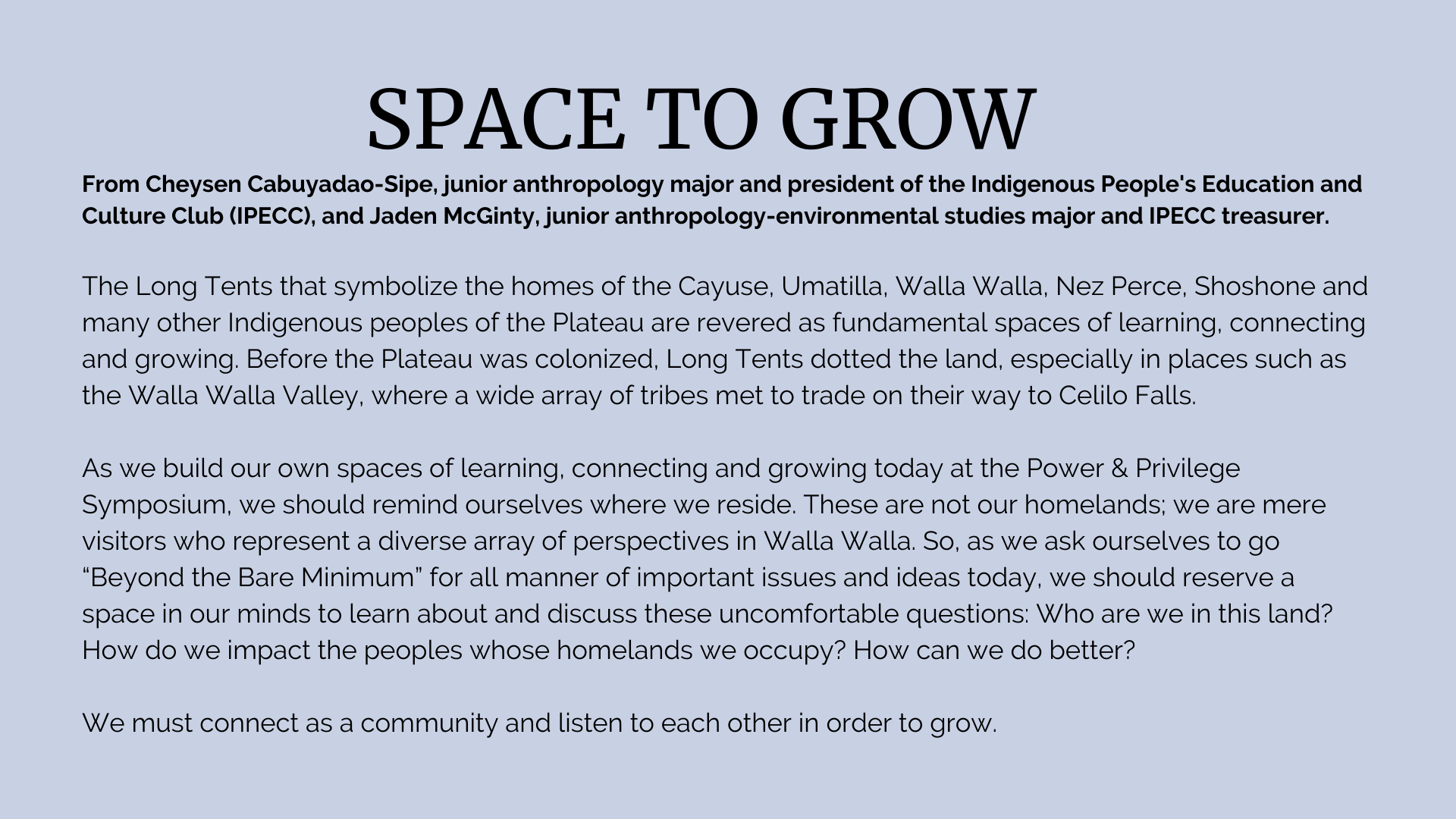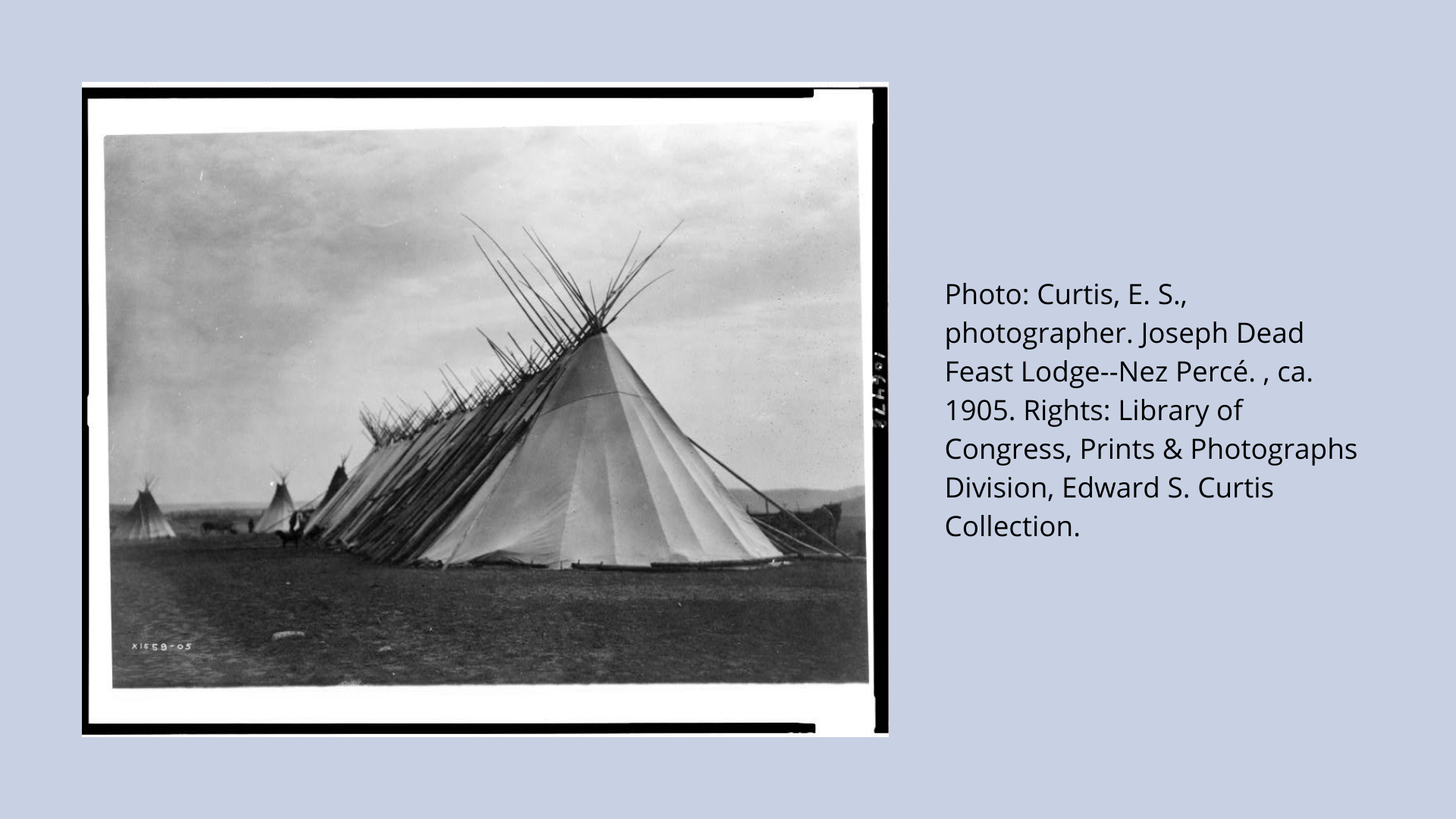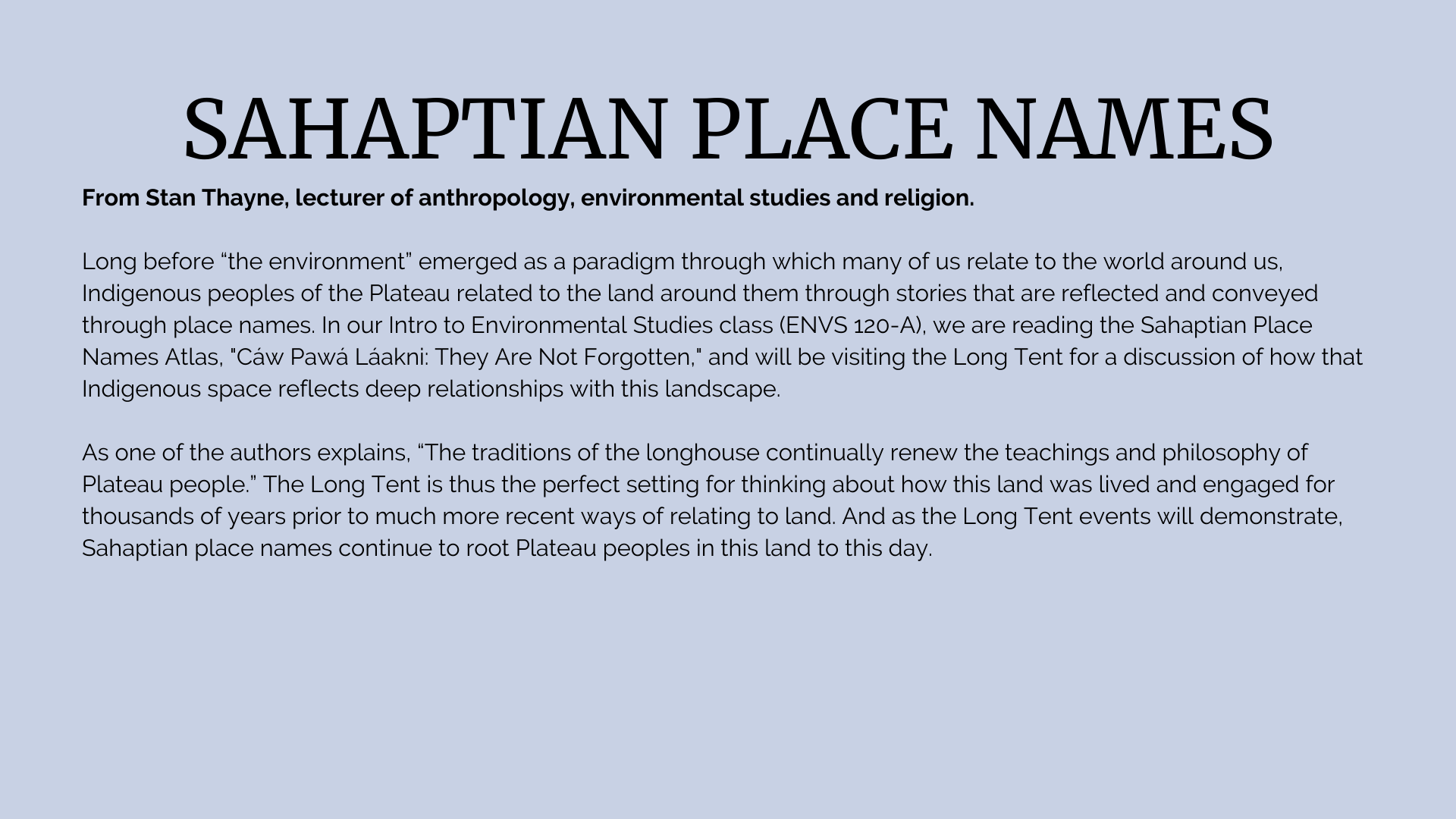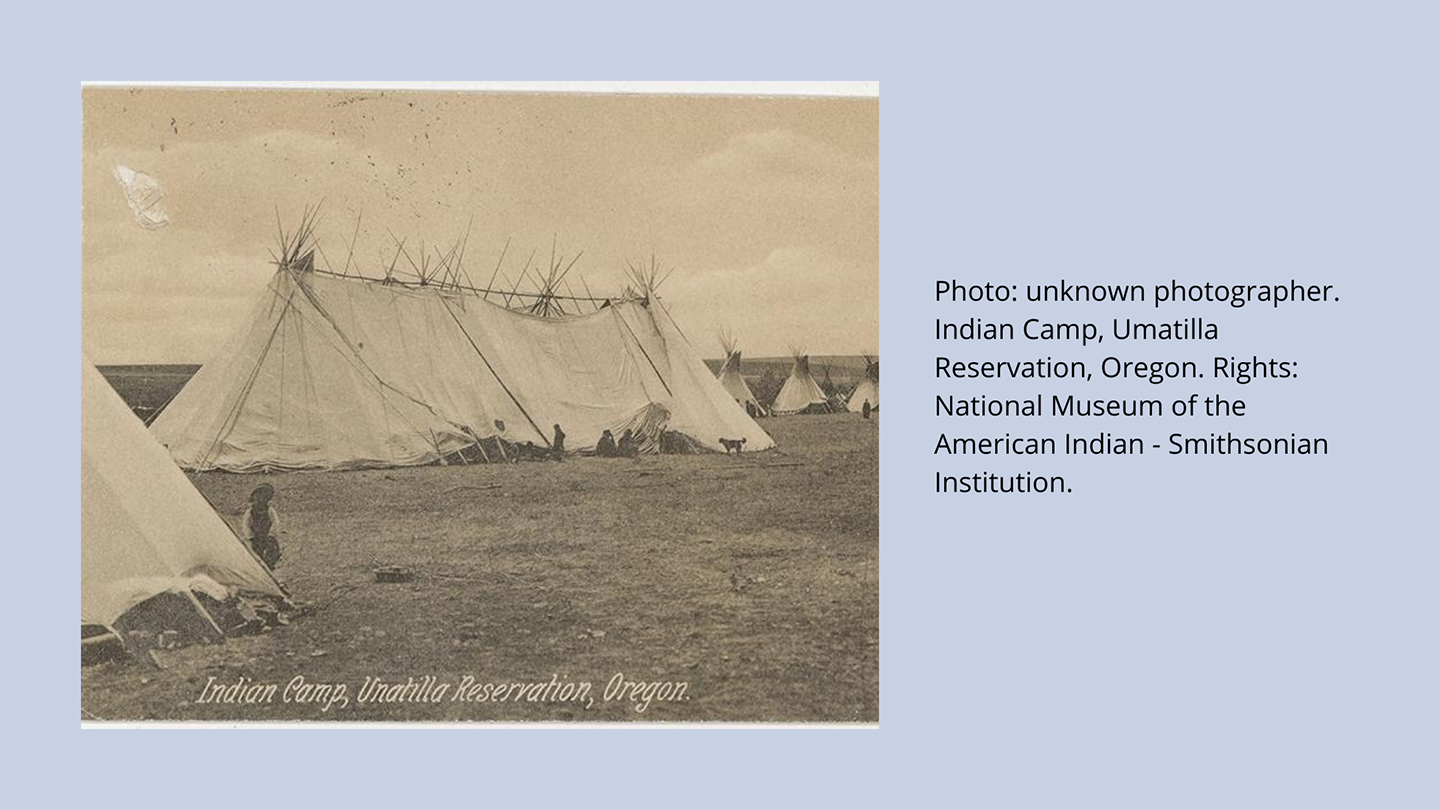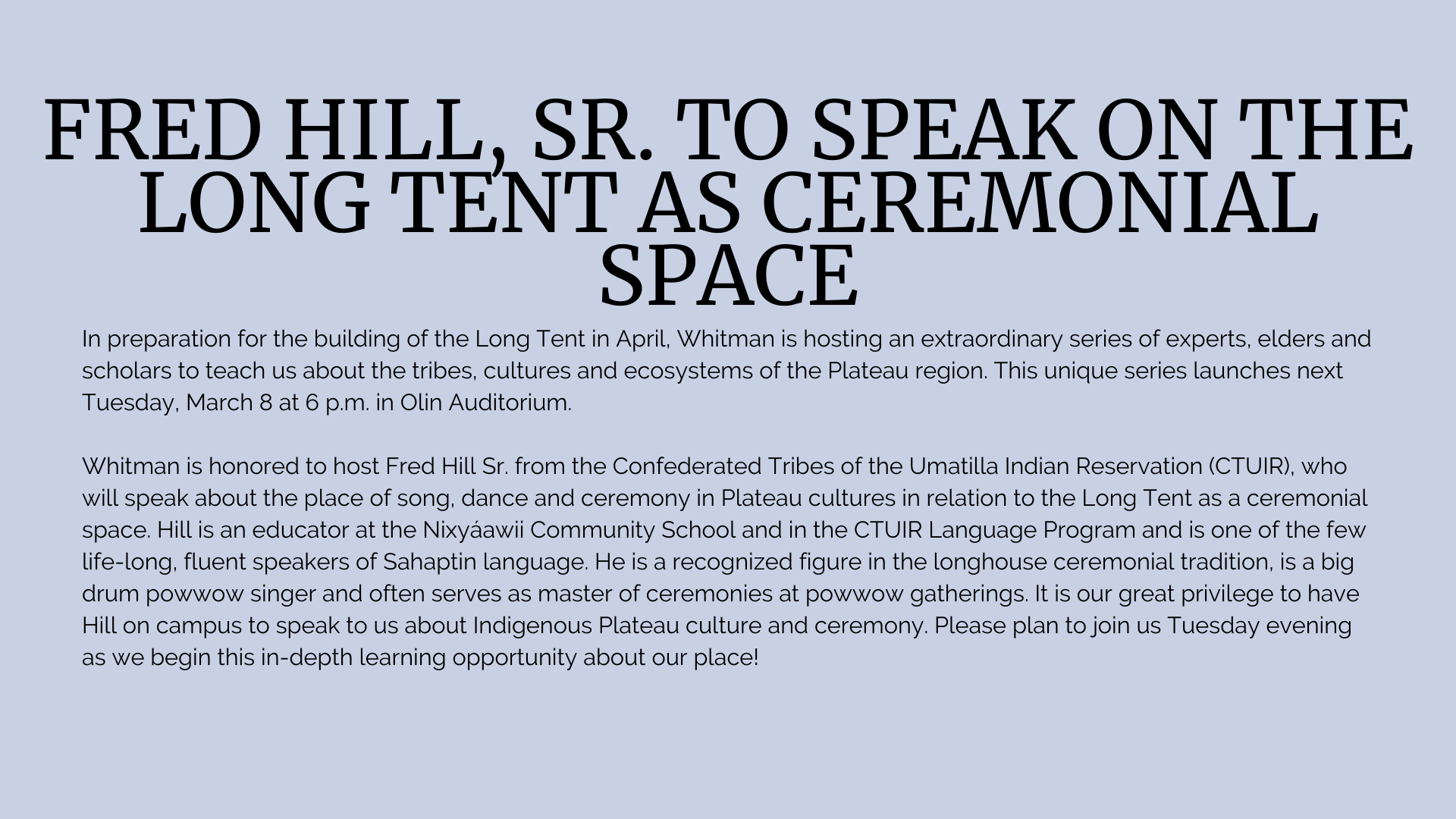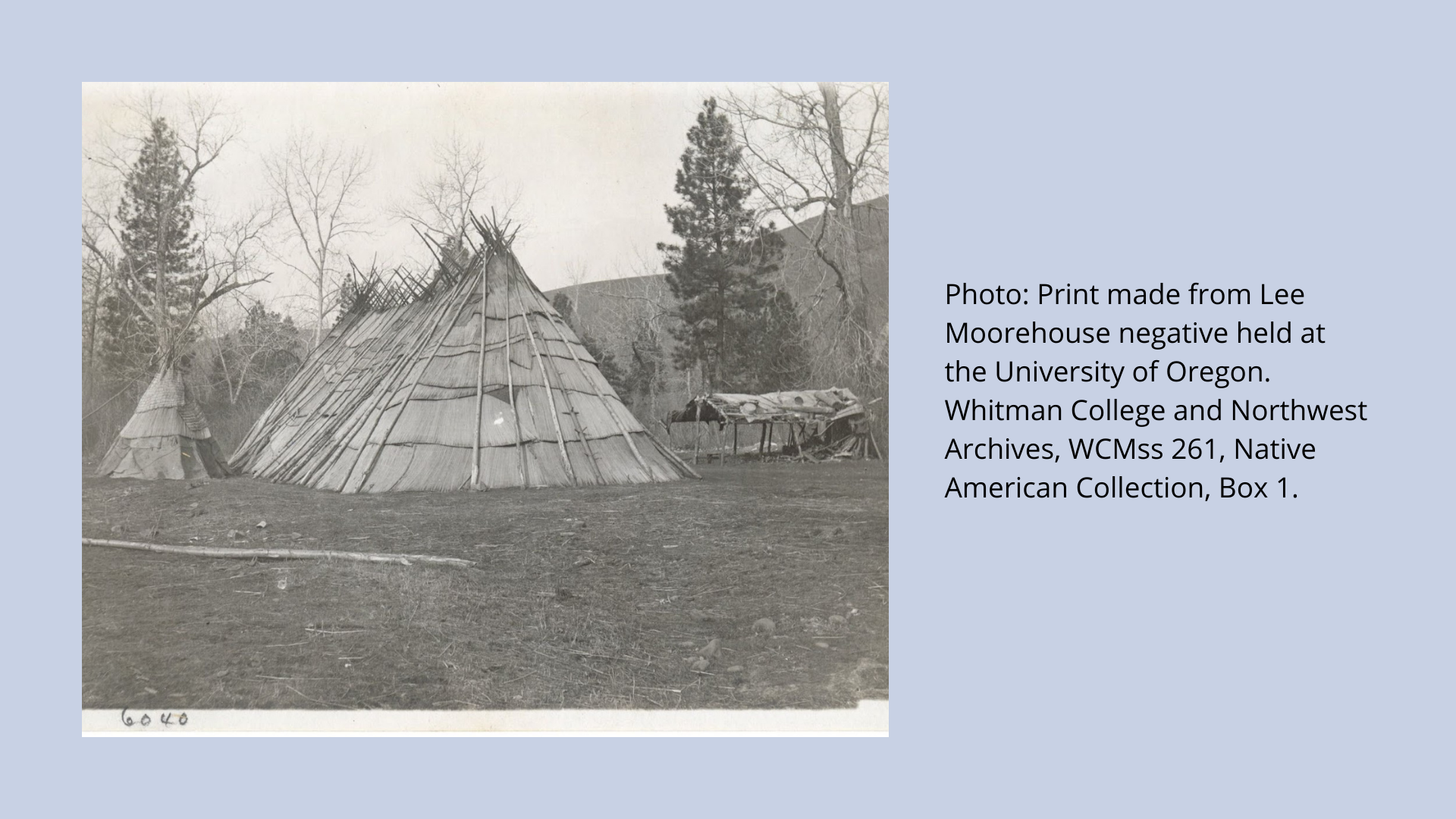The Long Tent
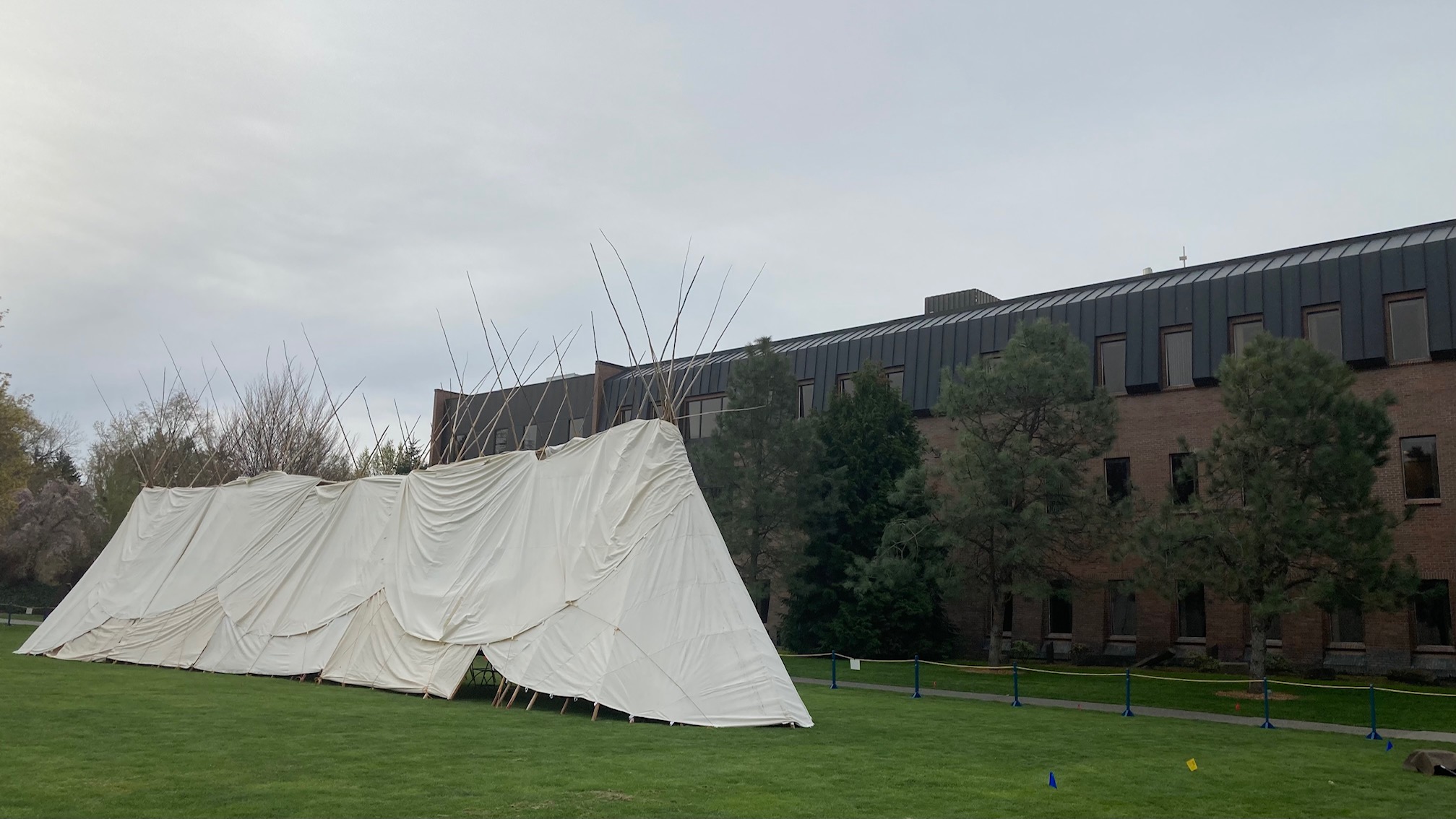
In the Spring 2022 semester, the Whitman community has a unique opportunity to grow our understanding of the history of the Walla Walla Basin and the Native communities connected to this area. In collaboration with Whitman alum Roger Amerman ’80 (Choctaw) and with the endorsement and partnership of the Confederated Tribes of the Umatilla Indian Reservation (CTUIR) as well as the Whitman Mission National Historic Site, a Plateau long tent will be built on Ankeny Field, open to visitors for programming to take place April 18-24.
In Amerman’s words, “The Long Tent is truly a stunning and majestic example of Indigenous architecture that is unique to the world and comes from the Inland Northwest/Columbia River Plateau region of North America.”
We are honored to welcome visitors to the Long Tent. If you need any accommodations in order to attend programming or enter the Long Tent, please contact Noah Leavitt (leavitn@whitman.edu).
Schedule of Events
Throughout the week, many dignitaries and elders from Plateau tribes will be sharing from their expertise, wisdom and experience.
We are also honored to welcome Thomas Morning Owl as the CTUIR Elder-in-Residence.
Whitman is honored to host Fred Hill Sr. from the Confederated Tribes of the Umatilla Indian Reservation (CTUIR), who will speak about the place of song, dance and ceremony in Plateau cultures in relation to the Long Tent as a ceremonial space. Hill is an educator at the Nixyáawii Community School and in the CTUIR Language Program and is one of the few life-long, fluent speakers of Sahaptin language. He is a recognized figure in the longhouse ceremonial tradition, is a big drum powwow singer and often serves as master of ceremonies at powwow gatherings.
The Whitman and Walla Walla communities have the opportunity to learn from Marjorie Waheneka, of Cayuse, Palouse, Umatilla and Warm Springs descent. Waheneka will share reflections on growing up with traditional elders and practicing traditional lifeways. In addition she will teach about Issues revolving around harvest of traditional cultural plants, past and present, and will address how gender is in play in these systems.
The talk will take place at 5:30 p.m. in Olin Auditorium. This event is open to the public; proof of being up-to-date on the COVID-19 vaccination and booster is required.
Speaker Information
Marjorie Waheneka 
Raised by her maternal grandparents on the Umatilla Indian reservation, Et-twaii-lish, Marjorie Waheneka, has devoted herself to passing the wisdom of tribal elders on to young people. She is of Cayuse, Palouse, Umatilla, and Warm Springs descent.
Over 40 years ago she became the first Native American US Park Ranger at the Whitman Mission National Historic Site in Walla Walla, Washington. In 1999, after many years of building bridges between the National Park Service and local tribes, she became Assistant Director of the Confederated Tribes of the Umatilla Reservation’s Tamástslikt Cultural Institute, a tribally-chartered museum near Pendleton, Oregon. She is now the Institute’s Living History Coordinator.
Kay Nielsen’s 1957 painting, “The Whitman Legend” is a large-scale stylized painting that evokes a mythic expression of American exceptionalism and Manifest Destiny. The painting’s visual narrative details the Whitman family’s legendary and tragic encounter not only with regional tribes, but with an equally hostile environment. Bisecting the canvas is a diagonal shaft of light that highlights historic Fort Walla Walla and the burial plot of the Whitman family (in contrast to a much darker and somber portrayal of Native Americans mourning their lost brethren). The details of the Whitman Massacre are well known; this presentation will take a closer look at the historic contexts that influenced the artist’s conceptual and creative intentions. The crossroads between the painting’s clear memorialization and its cultural divide due to pronounced Master narratives will be candidly considered and discussed.
This talk will take place at 6 p.m. in Hunter Conservatory's Kimball Theatre. The public is welcome to attend; proof of being up-to-date on the COVID-19 vaccine and booster is required. This event will also be livestreamed for online viewing at live.whitman.edu.
Speaker Information
 Michael Holloman
Michael Holloman
Michael Holloman is an associate professor in Fine Arts at Washington State University (WSU). He teaches undergraduate and graduate courses in Native American art history and the studio arts. Currently he also serves as the Coordinator for Native American Arts, Outreach and Education for the College of Arts and Sciences. From 2010-2014 he was the director of the WSU Plateau Center for American Indian Studies. Prior he was the director of American Indian exhibits, collection management, and educational programming at the Northwest Museum of Arts & Culture in Spokane. Holloman is an enrolled member of the Confederated Tribes of the Colville Indian Reservation. His scholarship focuses on abstract expressionist painter Clyfford Still and the 1930’s Nespelem Art Colony, and also early 20th century Japanese American photographer Frank S. Matsura. He is the proud father of two wonderful children and a working artist who continues to exhibit his paintings.
In the Walla Walla Sahaptin language, the long tent is known as kwalk ineet, and we are honored to welcome Don Sampson, the hereditary Chief of the Walúulapam (‘Walla Walla people’) and executive director of the Confederated Tribes of the Umatilla Indian Reservation (CTUIR), who will lead the Long Tent opening ceremony. Elders and dignitaries from the Confederated Tribes of the Umatilla Indian Reservation and neighboring tribes will also participate.
This event is open to the public and will take place at 4:30 p.m. at the Long Tent site on Ankeny Field.
This paired discussion of the concerted effort of past tribal leaders to preserve traditional lifeways, in relationship to land and in accordance with the provisions set forth in the 1855 Treaty, will take place at 5 p.m. in Maxey Auditorium. The public is welcome to attend; proof of being up-to-date on the COVID-19 vaccine and booster is required.
Speaker Information
 E. Thomas Morning Owl
E. Thomas Morning Owl
E. Thomas Morning Owl, Kakinash, was born and raised on the Umatilla Indian reservation of Oregon. He is of Umatilla and Kainai (Blood Band of the Blackfoot Confederacy), and can speak both of his tribal languages amongst other dialects and languages. During his Army service days he served as a translator for his unit while in the French speaking region of Belgium, and received an immersion crash course in Spanish while based in Honduras.
His love of languages began as a child where his grandmother Li’yat lived with the family. She was multi-lingual in northwest native dialects, but could not (or would not) speak English. His mother, Inez Spino-Reves, along with Li’yat, were language consultants with two world renowned linguists, Dr. Bruce Rigsby and Dr. Noel Rude. These were his first language teachers.
Morning Owl started the Umatilla tribe’s language program in 1996. He is currently teaching the Umatilla language at the Nixyaawi community school on the reservation. He also serves as the General Council Interpreter. He was first elected to tribal office in 1981 at the age of 18. Since that time he has served in various capacities in tribal politics.
He is now a recognized regional longhouse leader and cultural ceremonialist. He participates in the winter Medicine Dances as an “echo” and can conduct this ceremonial post in multiple regional languages and dialects.
 Nakia Williamson
Nakia Williamson
Ipeliikthil’aamkaw’aat (One Who Gathers the Clouds)
Williamson graduated from Lewis Clark State College, B.S. Social Science. He has gained much knowledge and education concerning the traditional ‘Way of life’ of the Nimiipuu (Nez Perce) from Nimiipuu Culture Bearers over a lifetime. Williamson worked in the area of Cultural Resource Management for more than 20 years and currently serves as Program Manager for the Nez Perce Tribe Cultural Resource Program, conducts and coordinating technical consultation with various federal/state agencies, such as the U.S. Army Corps of Engineers, Bonneville Power Administration, 13 National Forests and the Bureau of Land Management.
This paired discussion will take place at 5 p.m. in Maxey Auditorium. The public is welcome to attend; proof of being up-to-date on the COVID-19 vaccine and booster is required.
Speaker Information
 Mildred Quaempts
Mildred Quaempts
It’isyawak
Mildred Anne Quaempts, an enrolled Yakama tribal member, was born in Pendleton Oregon and raised by her maternal grandparents, Tom and Annie Tquanamy Joe, on the Umatilla Indian Reservation in the area known as Hawtmi (McKay Creek) with her two brothers. Mildred graduated from Chemawa Indian School in Salem Oregon in 1972 and currently has five children (one late), nine grandchildren, and one great granddaughter. Mildred has familial ties with the Cayuse, Warm Springs, Yakama, and Nez Perce tribes and also has family in Ardmore, Oklahoma. Her primary interest is her family but she also spends her time singing traditional songs, beading, sharing stories, and volunteering.
Mildred has been a traditional foods gatherer since a young age and currently shares her knowledge of the traditional foods with others through teaching, presentations, and outings. Mildred bases her teachings on her experience and emphasizes the practice that all traditional food gathering was family based and shared or traded. Her traditional food teachings often focus on the gathering, processing, and sharing/trading of dried fish, lamprey, roots, and berries, canned deer, elk, and salmon, and homegrown fruits and vegetables.
Mildred has been a public advocate the Missing and Murdered Indigenous People movement and domestic violence awareness and prevention. With personal ties to the issues, Mildred has given speeches, organized and assisted with events, marches, rallies, and protests, and provided personal support to individuals and families who are also experiencing these issues. She also has previous experience working with American Indian Movement (AIM) with a primary focus on violence against Native peoples.
Mildred has long been a Native Language advocate and currently works for the Confederated Tribes of the Umatilla Indian Reservation (CTUIR) as a Umatilla Master Speaker. During her time with the CTUIR Language Program, she has taught in many settings ranging from schools, to camps, and evening classes. Some of the places she has provided Umatilla Language instruction include: the Pendleton Early Learning Center, Washington Elementary in Pendleton, Nixyaawii Community School, University of Idaho, and La Grande’s Growing Community Roots project. She is currently teaching a pre-k immersion school for the Umatilla Language at the Nixyaawii Education Center.
Linda Sampson
Linda Sampson is the lead teacher at the CTUIR after-school program and a gatherer and educator on first foods.
This talk will take place at 5 p.m. in Maxey Auditorium. The public is welcome to attend; proof of being up-to-date on the COVID-19 vaccine and booster is required.
Speaker Information
 Josiah Pinkham
Josiah Pinkham
Josiah Blackeagle Pinkham was raised on the Nez Perce Indian Reservation in north-central Idaho and has worked in the cultural resource field for over 20 years as a Nez Perce Tribal Intern, Tribal Traditions Technician, Ethnographer and a Cultural Specialist. He has also worked on a variety of cultural resource workgroups with several federal, state and county agencies, as well as private corporations and other tribes.
Mr. Pinkham’s is responsible for communicating important Nez Perce values to the agencies whose work impact the Nez Perce people and tribal interests. Presently, his work deals with the Department of Energy’s (DOE) cleanup of the Hanford Nuclear Reservation in Central Washington where he participates in monthly Cultural Workgroup meetings with the DOE Richland Office. He also participates in the State and Tribal Government Working Group managed by the National Conference of State Legislatures and interfaces with the U.S. Fish and Wildlife Service and the Bonneville Power Administration. While he believes his knowledge comes from the elders and the Nez Perce landscape he is also a graduate of Lewis-Clark State College with an interdisciplinary honors degree in Native American studies and psychology. Mr. Pinkham regularly speaks to public schools, college classes and the public. He has travelled nationwide and has also travelled overseas for interpretative talks and cultural exchanges.
 Stella Sammaripa
Stella Sammaripa
Stella Sammaripa has four children, two huskies and my husband, Lonnie Jo Sammaripa Jr. She lives in Kamiah, ID, where she is working on her Bachelors degree in Native Environmental Science through distance learning from Northwest Indian College. She also works for the Nez Perce Tribe’s Language Program as the Language Technician for Kamiah. Her presentation, “Qéemu Revitalization and Nimipuutímt,” is part of her college capstone project, in which she built a map from ancestral knowledge of name-places, which is culturally sensitive, and then created a habitat suitability model through ArcGIS in order to rebuild populations of Qéemu (Indian Dogbane) on the Nez Perce Reservation.
 Anthony (Tony) Washines
Anthony (Tony) Washines
Kywamat
As a Yakama elder and fisherman, Tony assists with numerous Wa'ashat ceremonies throughout the usual and accustomed areas of the Fourteen Confederated Tribes and Bands of the Yakama people. Tony's family harvests salmon from tribal fishing sites on the Klickitat River using ancient and present day fishing techniques. He is often called upon for his extensive knowledge pertaining to fishing, family lineage, land, resource, and oral history. He dedicates much time to family as well as passing information to the younger generations.
This paired discussion with Q&A will take place at 5 p.m. in Maxey Auditorium. The public is welcome to attend; proof of being up-to-date on the COVID-19 vaccine and booster is required.
Speaker Information
 Laurie Arnold
Laurie Arnold
Laurie Arnold is an enrolled member of the Sinixt Band of the Colville Confederated Tribes. She is Associate Professor of History and Director of Native American Studies at Gonzaga University.
Recently she held both the Frederick W. Beinecke Senior Research Fellowship at Yale University and an American Council of Learned Societies Fellowship.
Her first book, Bartering with the Bones of Their Dead: The Colville Confederated Tribes and Termination, was published by the University of Washington Press. Her publications have appeared in Time Magazine and in scholarly journals including Montana: The Magazine of Western History, the Western Historical Quarterly, and The Public Historian.
She is a publicly engaged scholar and has collaborated on projects with the Northwest Museum of Arts and Culture, the High Desert Museum, the History Colorado Center, and the National Council on Public History. Her current research considers how contemporary Native American playwrights are using theatre to tell Native narratives of the past and present.
 Emily Washines
Emily Washines
Emily Washines, MPA, is a scholar and enrolled Yakama Nation tribal member with Cree and Skokomish lineage. She is a descendant of the Treaty of 1855 signer Chief Meninick (Confederated Tribes and Bands of the Yakama Nation 12 Stat 951). Her blog, Native Friends, focuses on history and culture. Building understanding and support for Native Americans is evident in her films, writing, speaking, and exhibits. Her research topics include the Yakama War, Native women, traditional knowledge, resource management, fishing rights, and food sovereignty. Emily speaks Ichiskiin (Yakama language) and other Native languages. She is a board member of the Museum of Culture and Environment and Columbia Riverkeeper. She is adjunct faculty at Yakima Valley College.
This day's activity will include booth presentations from a variety of community organizations between 12 and 4 p.m., including:
- Wenix Red Elk, First Foods (CTUIR Division of Natural Resources)
- Ethan Green and Kris Fischer, River Vision-Flood Plain Restoration (CTUIR Fisheries)
- Kate Kunkel-Patterson, Whitman Mission (National Park Service, Whitman Mission)
Presenter Information
Kris Fischer
Kris Fischer is a fisheries habitat biologist for the CTUIR Division of Natural Resources Habitat Department. He has six years of experience in program and project level fisheries management with 21 years of direct work experience in water quality, fisheries, hydrology, floodplain/habitat protection and restoration. Before working for CTUIR, Mr. Fischer worked for the Klamath Tribes for 15 years on a variety of water projects.
Ethan Green
Ethan Green is the Project Leader for the Walla Walla Fish Habitat Program at the Confederated Tribes of the Umatilla Indian Reservation, conducting large and small scale restoration, conservation, monitoring and assessment projects throughout the Walla Walla River basin to support the CTUIR First Foods mission and the River Vision.
Wenix Red Elk
Wenix Red Elk is the Public Outreach and Education Specialist for the Confederated Tribes of the Umatilla Indian Reservation's Department of Natural Resources (DNR). Wenix coordinates and implements First Food related educational presentations, activities and events for DNR’s Water Resources, Fisheries, Wildlife, Ag, Range and Forestry, First Foods Policy and the Cultural Resources Protection Programs. Wenix has over 16 years’ experience in Natural Resources. As a young adult, Wenix worked for the Earth Conservation Corps, Salmon Corps branch restoring and revitalizing plant and salmon habitats, watersheds and native vegetation to its natural habitat to stabilize fish populations and reintroduction of wild salmon stock back into watershed areas. Wenix has learned about her culture and tribal traditions from the time of birth. She has successfully taught over 225 cultural classes consisting of beading, tule mat making, traditional food gathering and preparation, quill working, sewing, and other forms of traditional arts. In the last 6 years has provided over 500 First Foods related presentations on behalf of the Umatilla Confederated Tribes DNR First Foods Management practices education over 40,000 people on her Tribes Restoration effort throughout their Ceded territories and beyond.
The Long Tent Closing Ceremony will take place at 2 p.m. Wilson Wewa will speak and tell stories, as well as conduct the ceremony.
Speaker Information
 Wilson Wewa has been involved with tribal language, culture and lifeways throughout his life. He was raised on the Warm Springs Indian Reservation in Central Oregon. As a child he spent countless hours hearing the stories of his family, tribe and past lifeways as they pertained to his life. Later, Wilson traveled extensively with his family and especially his grandmother to other parts of the Great Basin where he met many other Northern Paiute elders that added to his knowledge of his people. He continues to be called upon by his people as an orator, storyteller and funerary officiate.
Wilson Wewa has been involved with tribal language, culture and lifeways throughout his life. He was raised on the Warm Springs Indian Reservation in Central Oregon. As a child he spent countless hours hearing the stories of his family, tribe and past lifeways as they pertained to his life. Later, Wilson traveled extensively with his family and especially his grandmother to other parts of the Great Basin where he met many other Northern Paiute elders that added to his knowledge of his people. He continues to be called upon by his people as an orator, storyteller and funerary officiate.
Wilson works for the Confederated Tribes of Warm Springs as the Senior Wellness Coordinator, a position he has held since 1980, and, is consulted by other tribes and organizations in the United States on elders’ issues.
More recently, he was invited as a guest lecturer to the prestigious College of Willian & Mary in Virginia to speak on Native American issues that related to health, spirituality, environment and treaty rights as they pertain to water and land. He also works with the University of Oregon and Oregon State University as a consultant on Northern Paiute history and ethnobotany.
Long Tent Partners
The Long Tent is made possible through collaboration with the following partners:
- Confederated Tribes of the Umatilla Indian Reservation
- Tamástslikt Cultural Institute
- Nixya'awii Community School
- Whitman Mission National Historic Site
Generous financial investment in this initiative and these relationships is provided by the Office of the Provost and Dean of the Faculty.
Long Tent Images and Reflections
The Long Tent Working Group
The Long Tent Working Group is comprised of faculty, staff, students and members of local Native American communities.
- Roger Amerman ’80 (Choctaw)
- Cheysen Cabuyadao-Sipe ’23
- Director of Facilities Tony Ichsan
- Sheehan Gallery Director Kynde Kiefel
- Associate Dean for Faculty Development and Professor of Sociology Helen Kim
- CCEC Director Noah Leavitt
- Yakama and Nez Perce tribal descendent Lonnie Sammaripa, Jr.
- Environmental Studies Lecturer Stan Thayne
- Provost Alzada Tipton
